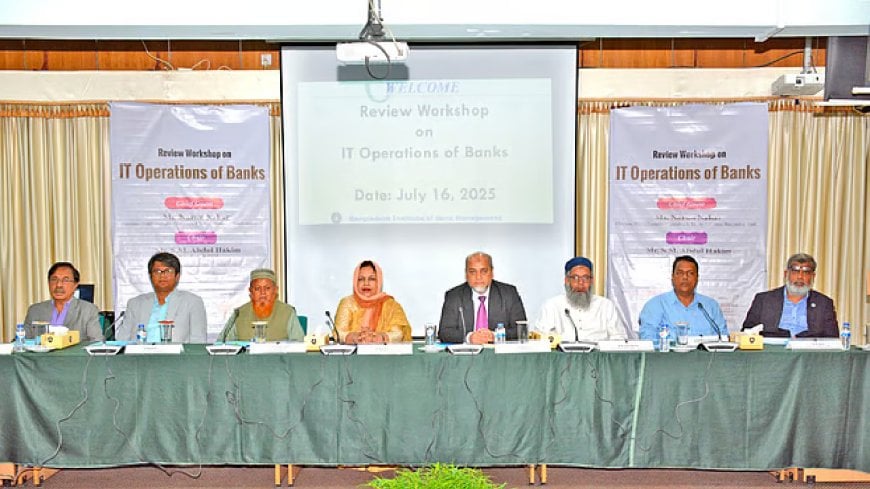Banking on Bytes: ICT Investment Drops Despite Digital Growth

Information technology (IT) infrastructure investment in Bangladesh’s banking sector has seen a decline of BDT 1.33 billion over the past two years. In 2022, 33 local and foreign banks operating in the country collectively invested BDT 24.70 billion in IT infrastructure. By 2024, that figure had dropped to BDT 23.37 billion.
The latest data, presented on Wednesday, July 16, during a workshop held at the Bangladesh Institute of Bank Management (BIBM) auditorium, revealed that in 2024, banks spent nearly 41 percent of their IT budgets on hardware and 29.3 percent on software. Alarmingly, less than 9 percent of the investment was allocated for IT security, audit, and training—sectors critical to building digital resilience.
The research findings were jointly presented by four BIBM faculty members and the Chief Information Officer of a private bank. The study cited several causes behind the declining investment, including deteriorating financial health of many banks, institutional weaknesses, a surge in non-performing loans, and overall mismanagement in the sector. Misappropriation of funds and failure to recover large loans have severely impacted banks' balance sheets, resulting in reduced capacity to invest in long-term sectors such as IT. Furthermore, a lack of good governance and regulatory oversight continues to hinder digital transformation initiatives in the banking sector.
However, progress was noted in internet banking services. In 2015, only 52 percent of banks offered such services, but by 2024, almost every bank has implemented transaction-based internet banking. The number of customers using this service rose from 3.245 million in 2020 to approximately 11.2 million in 2024, while the number of transactions surged from 24.4 million to over 150 million during the same period.
Shihab Uddin and Faisal Hasan, two BIBM researchers, jointly presented the findings on behalf of the research team. "Younger generations are more inclined towards digital transactions. Therefore, it’s crucial for banks to establish efficient IT governance and utilize automation to enhance service accuracy," said Shihab Uddin during the presentation.
Faisal Hasan emphasized the need for greater focus on cybersecurity, audit, and staff training. “A large portion of bank IT budgets is spent on hardware and software acquisition. However, allocations for security, audit, and training remain insufficient. This share should be raised to at least 15 percent,” he suggested.
Speaking as the chief guest, Bangladesh Bank Deputy Governor Nurun Nahar said, “More investment is needed in IT training and infrastructure in banks. Although costly, we must not shy away from this responsibility. We must remain vigilant to prevent future mishaps, keeping in mind the 2016 reserve heist incident.”
Other speakers at the workshop included BIBM's A.K. Gangopadhyay Chair Professor Faruq M. Ahmed, BIBM Director General Abdul Hakim, Bangladesh Bank Executive Director Debdulal Roy, and Pubali Bank Managing Director and CEO Mohammad Ali.
The research presented during the workshop proposed 14 recommendations to improve the banking sector's IT landscape. These included increasing sector-specific IT budget allocations, ensuring adequate personnel for audit, security, and MIS, expanding cash recycler machines in rural areas, and strengthening data security systems.









































































































































































































